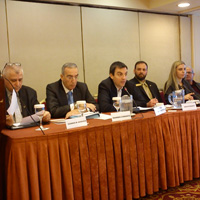Athens in RIEAS Panel on Security, Intelligence in Greece
December 18, 2015

Faculty from Webster Athens participated in a book presentation organized by the Research Institute for European and American Studies and featuring a panel of representatives from Webster, Greek news media and the diplomatic and intelligence services.
They discussed concepts from the book, "National Security and Contemporary Intelligence Services in Greece," authored by Joseph Fitsanakis of Coastal Carolina University, who has built the Security and Intelligence Studies program at King University and has conducted extensive research on communications interception, intelligence reform, and transnational criminal networks.
John Nomikos, head of the History Politics and International Relations department at Webster Athens, noted that in the current information age, people are constantly bombarded by facts, opinions, speculations, and rumors from every direction. Television carries into homes each night unsettling images of misery and death from around the world. Computers draw people into an interactive sphere where e-mail gives, and expects in return, ever more rapid exchanges of information. The cellular telephone assures that a flow of information will follow everywhere: into a car, the mall, and the meeting place.
He acknowledged that as Fitsanakis suggests, no doubt that since the intelligence community works its way into the 21st century, complex information technology and methodologies need to be mastered and integrated into the intelligence process. He confirmed that cyberattacks against military and political networks have multiplied in frequency and technical complexity.
The head of the Admissions Office at Webster Athens, Antonia Dimou, provided an overall approach to the book, stressing that the relationship between democracy and the character of secret intelligence presents a composite two-sided puzzle. On one side, the very concept of democracy demands that an intelligence agency serves democratic interests by providing one country’s security and preparedness against potential threats both internal and external, she said. The core notion is that a stronger country can turn itself into a heaven where democracy can continue to be practiced. On the other side, intelligence investigative methods in many countries occur outside the context of democratic control and oversight mechanisms, thus surfacing an inherent conflict.
She highlighted the case of Greece noting that the geopolitical upheavals in the East Mediterranean and the wider Middle East especially after 9/11, and the evolving severe economic crisis that Athens undergoes necessitate more than ever before an efficient national intelligence agency to counter multiple threats ranging from criminal networks to terrorism. She voiced that it is no secret that one of the prime challenges to Greece’s national security is the one posed by the continuous flow of refugees and/or migrants as a number of foreign fighters who have joined ISIS pretend to be migrants/refugees with the aim to penetrate the European Union and initiate terrorist attacks on European soil.
The book was also presented by Ambassador Ioannis Corantis, former director of the Greek Intelligence Service, and Costas Papadopoulos, editor of Potamos Publishing Company. The event was moderated by Costas Papachlimintzos, managing editor of ESTIA newspaper.
The book presentation was attended by Webster Athens vice-chancellor for Academic Affairs Susie Michaelidis, academic advisor and Special Programs coordinator Ellie Despotaki and intern Nadia Black.
